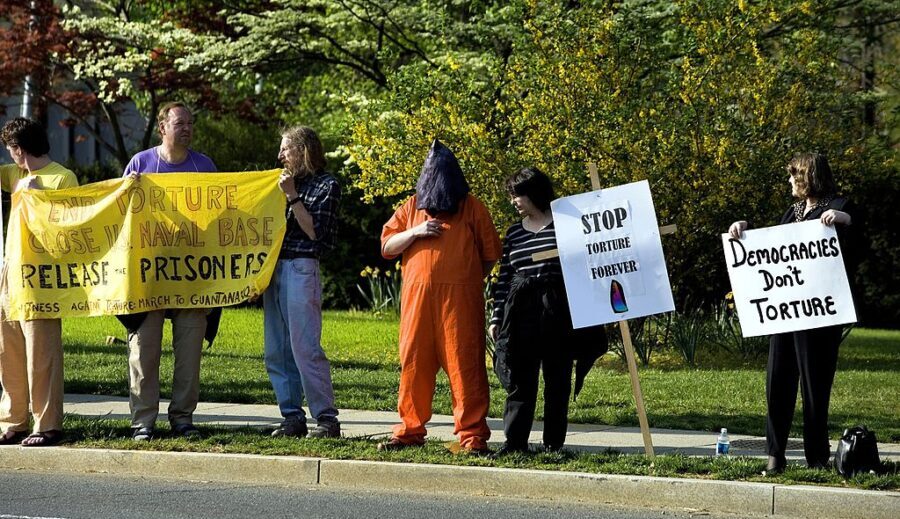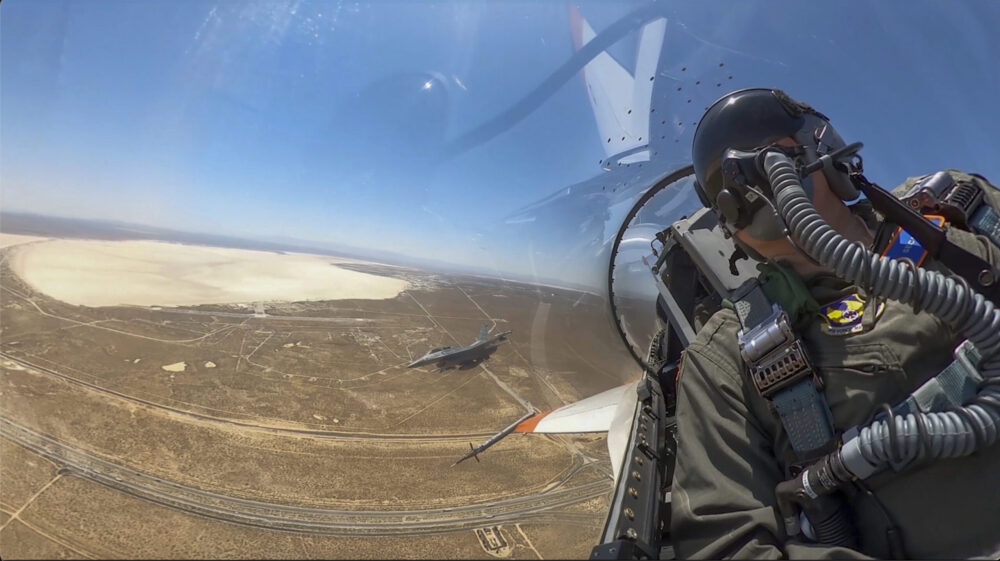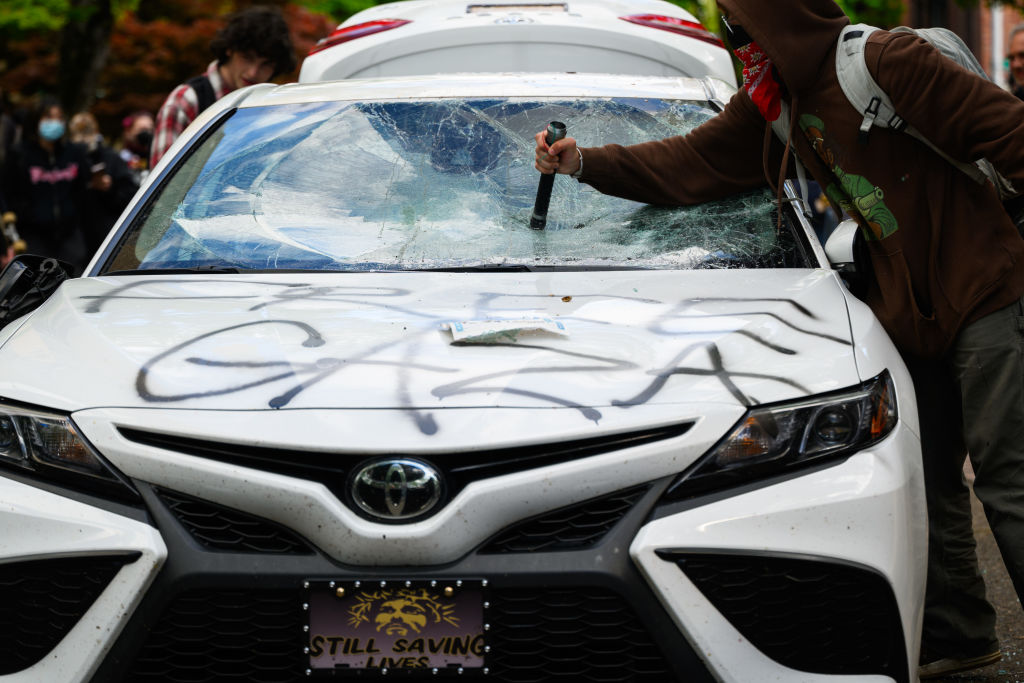Jury deliberating in Iraq Abu Ghraib prison abuse civil case; contractor casts blame on Army
Apr 22, 2024, 4:15 PM

WASHINGTON - APRIL 14: Activists line Wisconsin Avenue during a vigil outside the residence of Vice President Dick Cheney at the Naval Observatory April 14, 2006 in Washington, DC. The vigil organized by Washington Region Religious Campaign Against Torture was held to protest policies and practices of the Bush Administration which they claim lead to cruel and inhumane treatment of detainees in the war on terrorism. (Photo by Brendan Smialowski/Getty Images)
(Photo by Brendan Smialowski/Getty Images)
ALEXANDRIA, Va. (AP) — A lawyer for the military contractor being sued by three survivors of the notorious Abu Ghraib prison in Iraq told jurors Monday that the plaintiffs are suing the wrong people.
“If you believe they were abused … tell them to make their claim against the U.S. government,” said John O’Connor, defense attorney for Reston, Virginia-based military contractor CACI, during closing arguments at the civil trial in federal court. “Why didn’t they sue the people who actively abused them?”
The lawsuit brought by the three former Abu Ghraib detainees marks the first time a U.S. jury has weighed claims of abuse at the prison, which was the site of a worldwide scandal 20 years ago when photos became public showing U.S. soldiers smiling as they inflicted abusive and humiliating treatment on detainees in the months after the U.S. invasion and occupation of Iraq.

BAGHDAD, IRAQ – MAY 21: An Iraqi man waits for the release of his relative detained in the Abu Ghraib prison May 21, 2004 outside of Baghdad, Iraq. More than 400 prisoners were released from the prison west of Baghdad that has become the center of prisoner abuse scandal involving members of U.S military. (Photo by Wathiq Khuzaie/Getty Images)
The suit alleges that civilian interrogators supplied by CACI to Abu Ghraib contributed to the torture the plaintiffs by conspiring with military police to “soften up” detainees for interrogations.
CACI, in its closing arguments, relied in part on a legal theory known as the “borrowed servant doctrine,” which states an employer can’t be liable for its employees’ conduct if another entity is controlling and directing those employees’ work.
In this case, CACI says the Army was directing and controlling its employees in their work as interrogators.
Lawyers for the plaintiffs disputed that CACI relinquished control of its interrogators to the Army. At trial, they introduced evidence that CACI’s contract with the Army required CACI to supervise its own employees. Jurors also saw a section of the Army Field Manual that pertains to contractors and states that “only contractors may supervise and give direction to their employees.
Muhammad Faridi, one of the plaintiffs’ lawyers, told jurors that the case is simpler than CACI’s lawyers are trying to make it.
He said that if CACI interrogators conspired with military police to inflict abuse on detainees to soften them up for interrogations, then the jury can find CACI liable even if CACI interrogators never themselves inflicted abuse on any of the three plaintiffs.All three plaintiffs testified to horrible treatment including beatings, sexual assaults, being threatened with dogs and forced to wear women’s underwear, but said the abuse was either inflicted by soldiers, or by civilians who couldn’t be identified as CACI workers. In some cases, the detainees said they couldn’t see who was abusing them because they had bags over their heads.
“Two decades ago this month photos of smiling US soldiers posing with humiliated detainees at Iraqs Abu Ghraib prison caused world wide shock, and after years of legal battles, the lawsuit bought by 3 prisoners finally began on Monday” pic.twitter.com/EyIWy7e4zm
— Saul Staniforth (@SaulStaniforth) April 16, 2024
As evidence of CACI’s complicity, jurors heard testimony from two retired generals who investigated the Abu Ghraib scandal in 2004; both concluded that CACI interrogators engaged in misconduct.
Faridi told the jury that while many of the soldiers who abused detainees were convicted and sentenced to prison, CACI has not yet been held accountable.
“When our country’s military found out about the abuse, they didn’t cover it up,” Faridi said. “Our country’s military held the military police members who were perpetrating the abuse accountable. CACI escaped liability.”And Faridi said that even when the Army asked CACI to hold its its interrogators responsible, it still sought to evade responsibility. In May 2004, the Army asked CACI to fire one of its interrogators, Dan Johnson, after one of the Abu Ghraib photos showed Johnson interrogating a detainee who was forced into an awkward crouching position that investigators concluded was an illegal stress position.
“Two decades ago this month photos of smiling US soldiers posing with humiliated detainees at Iraqs Abu Ghraib prison caused world wide shock, and after years of legal battles, the lawsuit bought by 3 prisoners finally began on Monday” pic.twitter.com/EyIWy7e4zm
— Saul Staniforth (@SaulStaniforth) April 16, 2024
CACI contested Johnson’s dismissal, writing that the “photo depicts what appears to be a relatively relaxed scene” and saying that “squatting is common and unremarkable among Iraqis.”
“I’ll leave that to you to consider whether you find that offensive,” Faridi told the jury Monday.
At trial, CACI employees testified they defended Johnson’s work because Army personnel had asked them through back channels to do so. O’Connor said that out of the many hundreds of photos of abuse at Abu Ghraib, the photo of Johnson is the only one depicting a CACI employee, and it shows him questioning not one of the plaintiffs but an Iraqi policeman after someone had smuggled a gun into the prison and shot at military police.
O’Connor also apologized for parts of his case that were “long, annoying and boring” but said he had no choice because the U.S. government claimed that some evidence, including the identities of interrogators, was classified. So jurors, rather than hearing live testimony, were subjected to long audio recordings in which the interrogators’ voices were doctored and their answers were often interrupted by government lawyers who instructed them to not answer the question.
“Two decades ago this month photos of smiling US soldiers posing with humiliated detainees at Iraqs Abu Ghraib prison caused world wide shock, and after years of legal battles, the lawsuit bought by 3 prisoners finally began on Monday” pic.twitter.com/EyIWy7e4zm
— Saul Staniforth (@SaulStaniforth) April 16, 2024
The trial was delayed by more than 15 years of legal wrangling and questions over whether CACI could be sued. Some of the debate focused on the question of immunity — there had long been an assumption that the U.S. government would hold sovereign immunity from a civil suit, and CACI argued that, as a government contractor, it would enjoy derivative immunity.
But U.S. District Judge Leonie Brinkema, in a first-of-its-kind ruling, determined that the U.S. government cannot claim immunity in cases involving fundamental violations of international norms, such as torture allegations. And, as a result, CACI could not claim any kind of derivative immunity, either.













